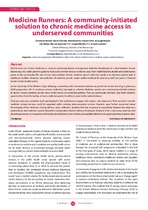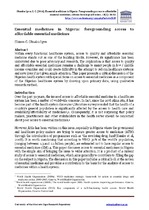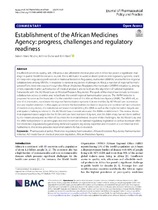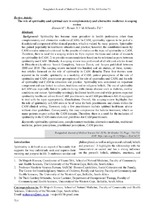| dc.contributor.author | Boswell, Dominique | |
| dc.contributor.author | Conradie, Sharon | |
| dc.contributor.author | Keshave, Bindia | |
| dc.contributor.author | Khan, Tasneem | |
| dc.contributor.author | Mngadi, Sinegugu | |
| dc.contributor.author | Tebeile, Lefa | |
| dc.contributor.author | Van Huyssteen, Mea | |
| dc.contributor.author | Bheekie, Angeni | |
| dc.contributor.author | Kiewiets, Damaris | |
| dc.date.accessioned | 2020-10-30T08:49:20Z | |
| dc.date.available | 2020-10-30T08:49:20Z | |
| dc.date.issued | 2018 | |
| dc.identifier.citation | Boswell, D. et al. (2018). Medicine Runners: A community-initiated solution to chronic medicine access in underserved communities. S Afr Pharm J, 85(4), 64-67 | en_US |
| dc.identifier.uri | http://www.sapj.co.za/index.php/SAPJ/article/view/2611 | |
| dc.identifier.uri | http://hdl.handle.net/10566/5315 | |
| dc.description.abstract | Patient access to chronic medicines is crucial in optimising disease management. With the introduction of a decentralised chronic
dispensing unit, stable patients qualify to have access to their chronic medicines away from health facilities at alternative distribution
points in the community. The aim of such decentralised chronic medicine ‘parcel’ collection points is to minimise patient load at
healthcare facilities. However, non-collection of medicine parcels creates added workload for pharmacy staff and poses a financial
burden on the health system.
At the University of the Western Cape, following a workshop with community members as part of the service learning in pharmacy
(SLiP) programme (2017), medicine runners (collectors) emerged as a theme. Medicine runners are a community-initiated solution
to deliver chronic medicine parcels closer to the homes of vulnerable patients. They are community members who fetch medicine
parcels either from the facility, or from a collection point, for delivery closer to the patient’s home.
Final year pharmacy students (n=6) participated in the workshop to engage with various role-players (n=19) to ascertain how the
medicine runners services could be regulated within existing pharmaceutical services. Students were further concerned about
the integrity of the medicines during delivery. Upon reflection, students felt that reciprocal accountability between the pharmacy
professionals and medicine runners should be incorporated into the delivery framework. Evidence from a pharmacy alumnus who
shared experiences on innovative community-based delivery interventions, exemplified adherence to good pharmacy practice rules. | en_US |
| dc.language.iso | en | en_US |
| dc.publisher | Medpharm | en_US |
| dc.subject | Medicine delivery | en_US |
| dc.subject | Medicine runners | en_US |
| dc.subject | Chronic medicine access | en_US |
| dc.subject | Community engagement | en_US |
| dc.subject | Differentiated model of care | en_US |
| dc.title | Medicine Runners: A community-initiated solution to chronic medicine access in underserved communities | en_US |
| dc.type | Article | en_US |




